CABARET
book by Joe Masteroff | music by John Kander | lyrics by Fred Ebb
based on the play by John Van Druten & the stories of Christopher Isherwood
Whitney Theater, Yale College
February 5-7 & 12-14, 2015
A Theater Studies Senior Thesis Project in Directing for Noam Shapiro
*** Featured in Playbill.com's List of "Innovative Collegiate Productions from 2014-2015" ***
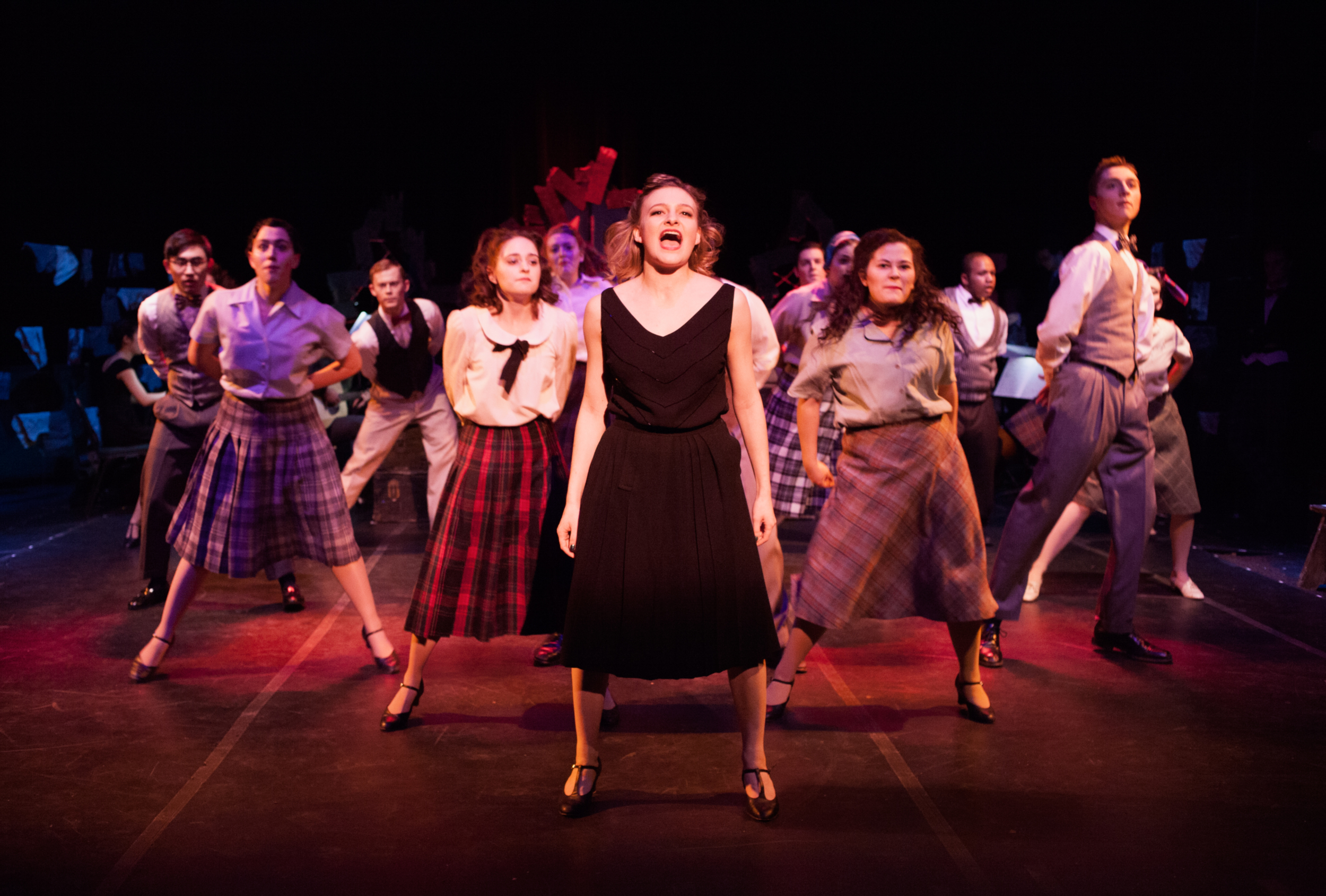
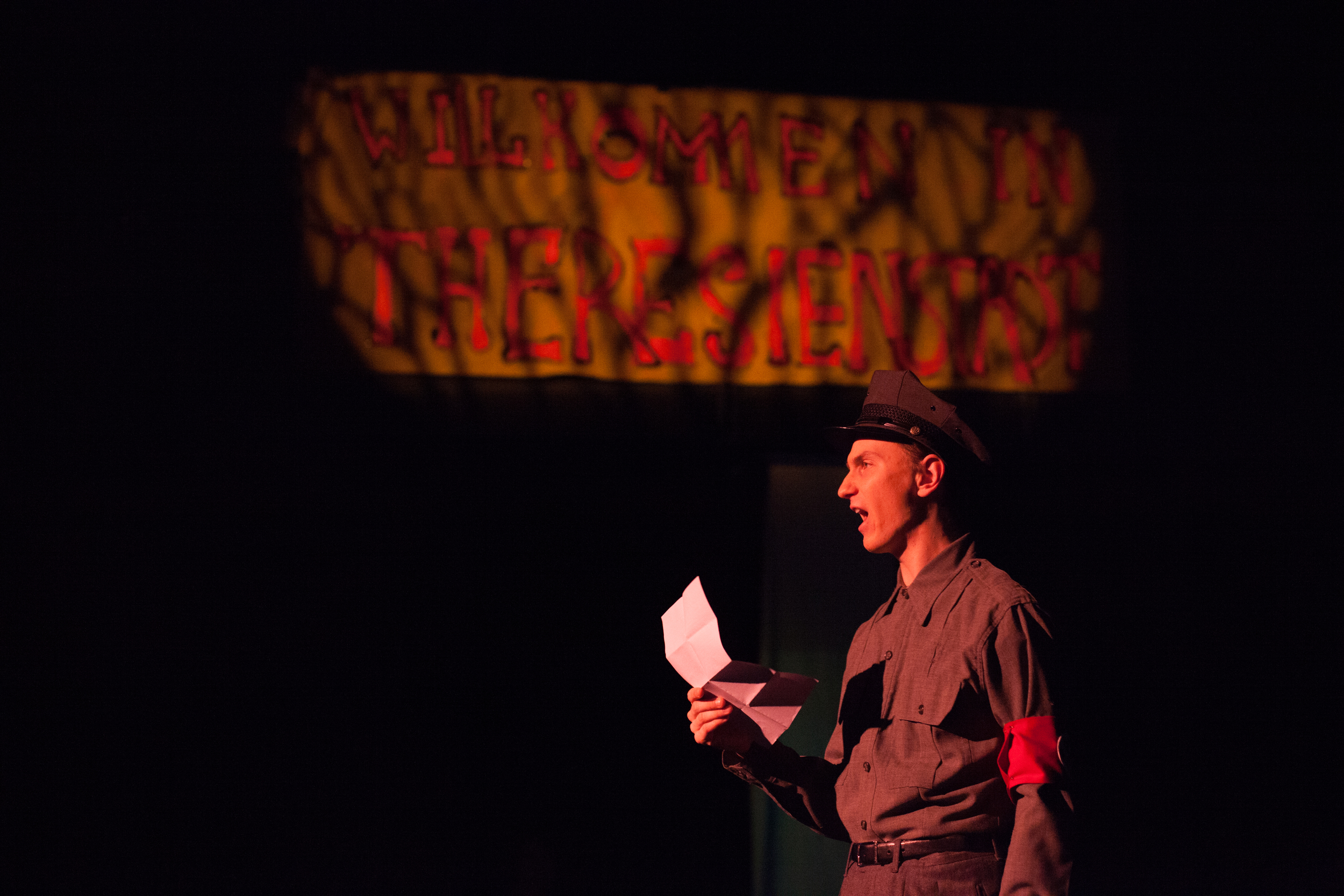
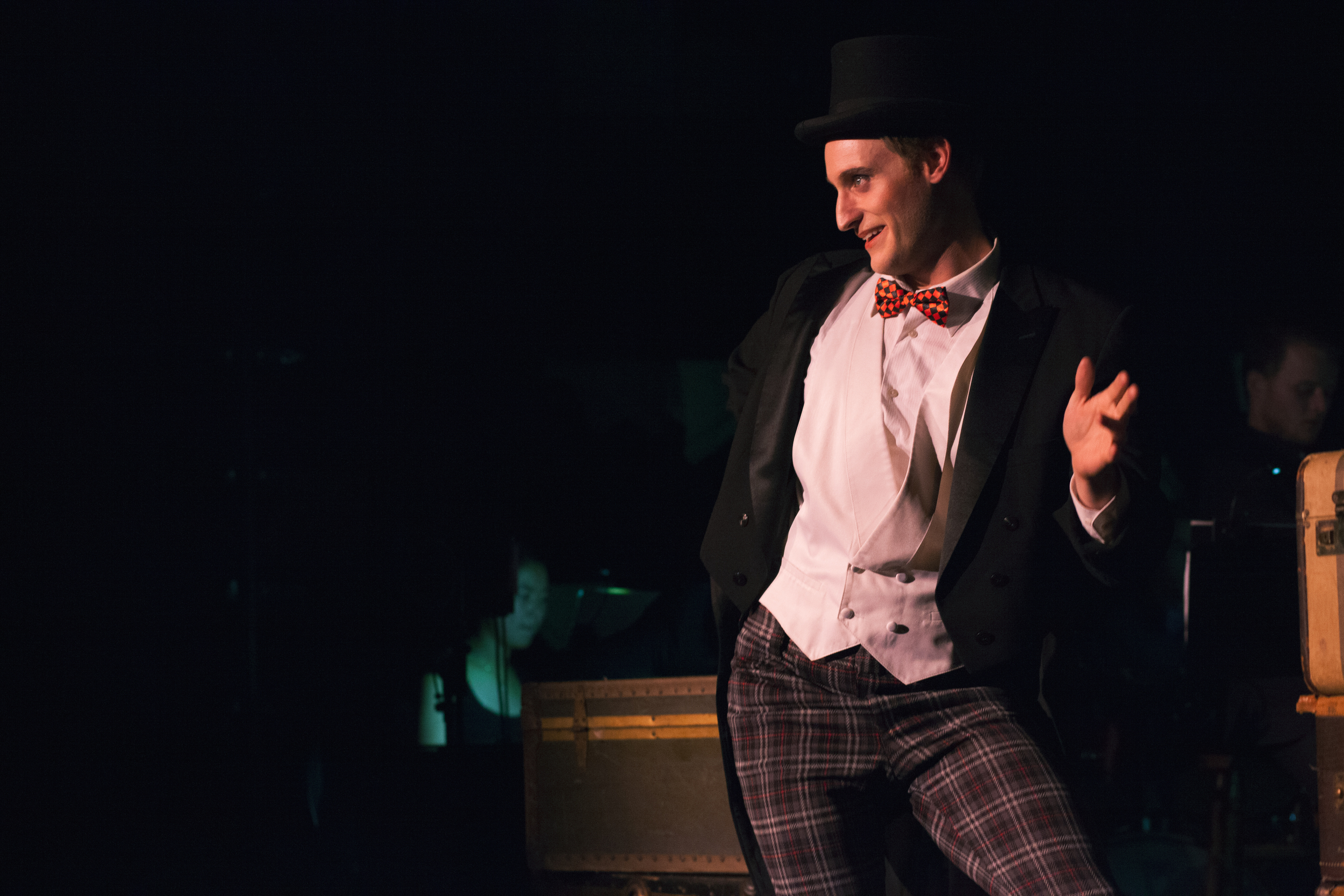
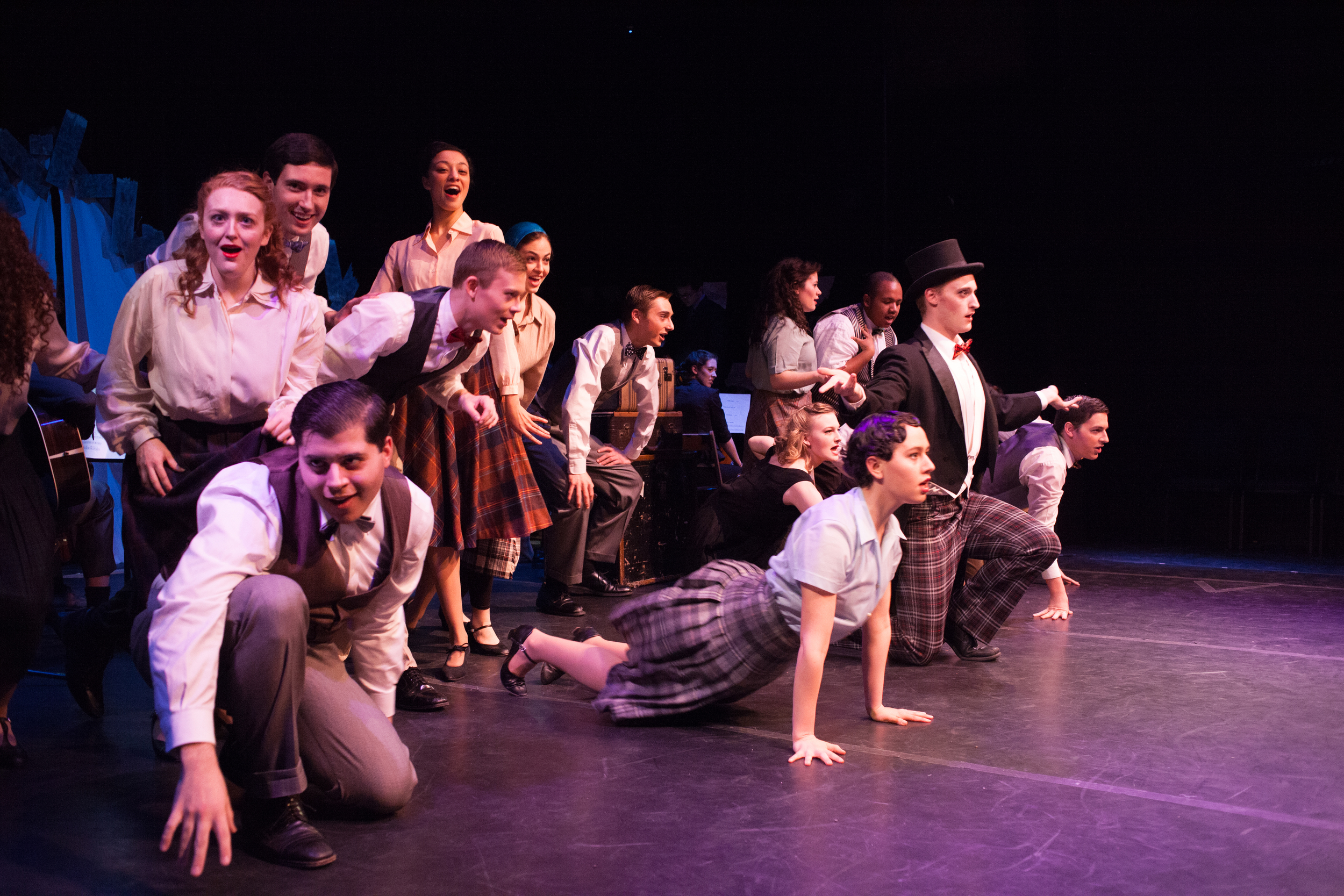
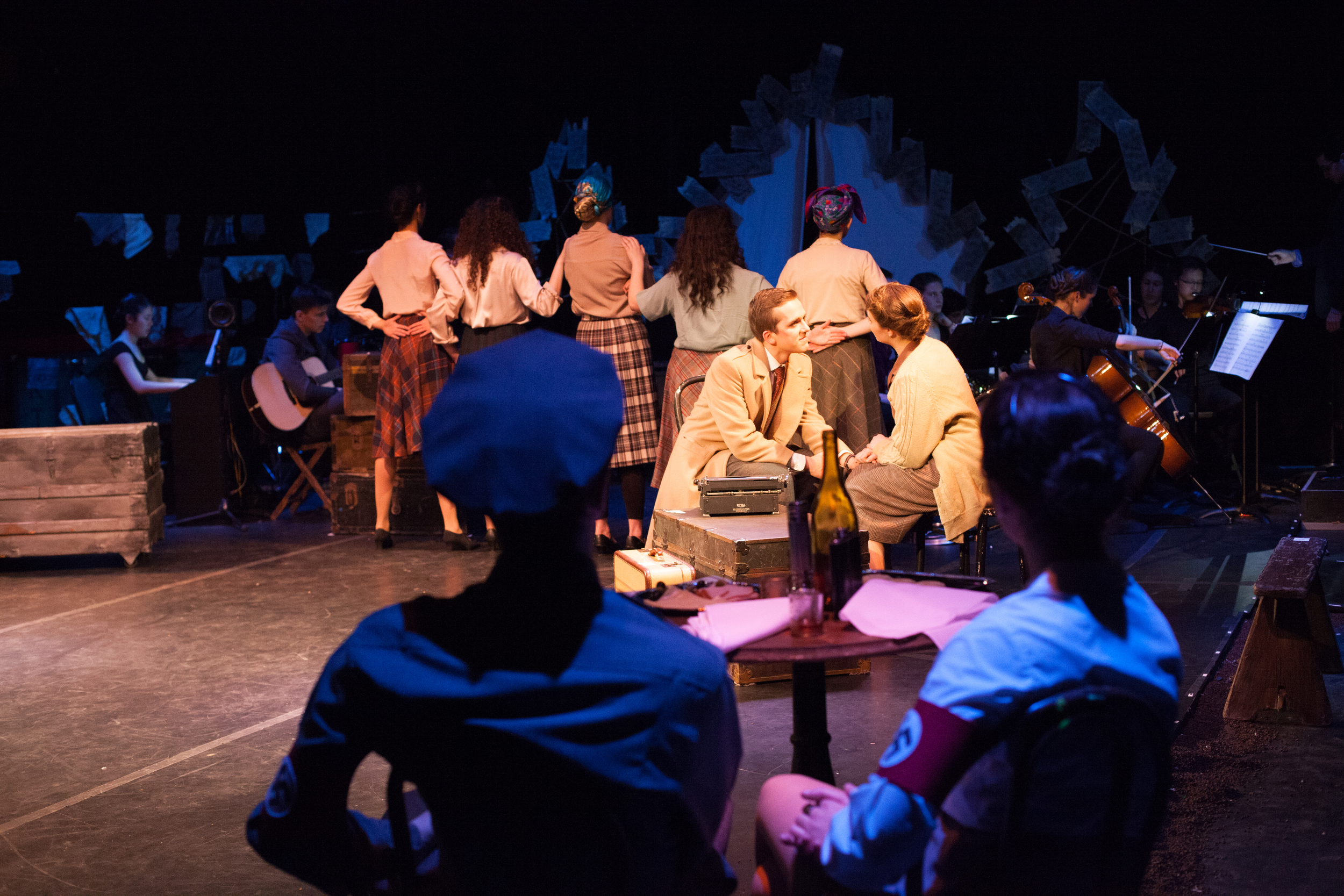
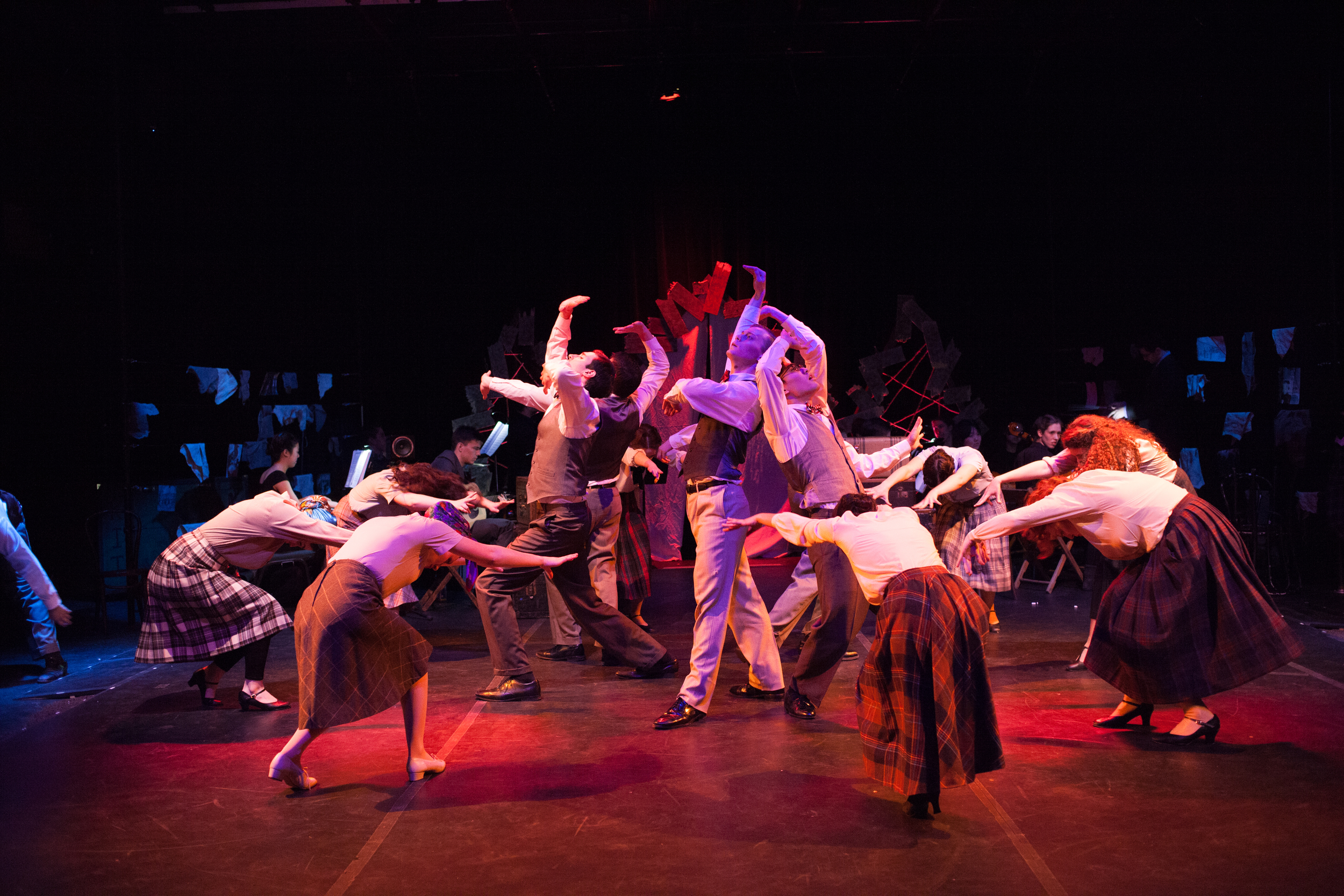
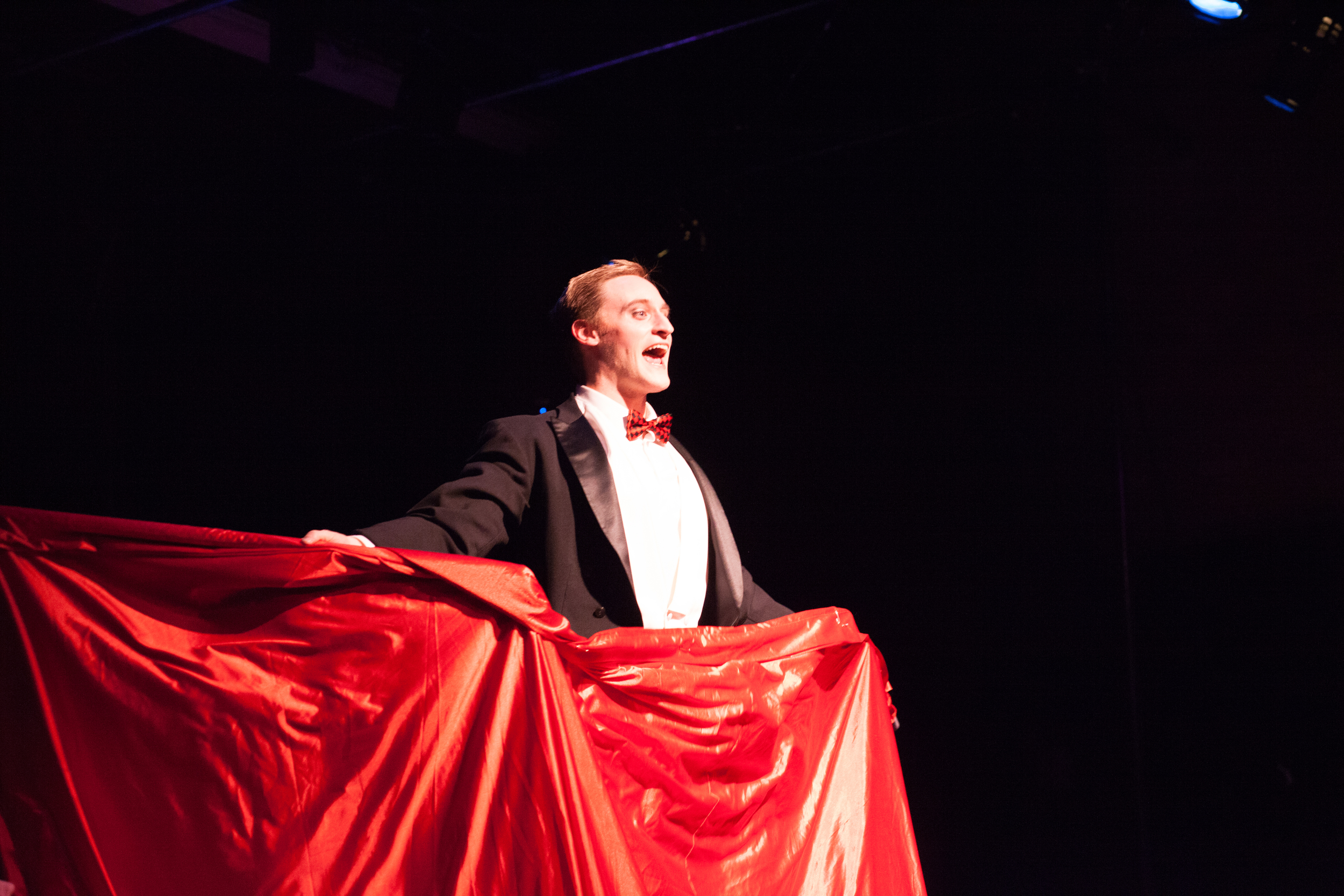
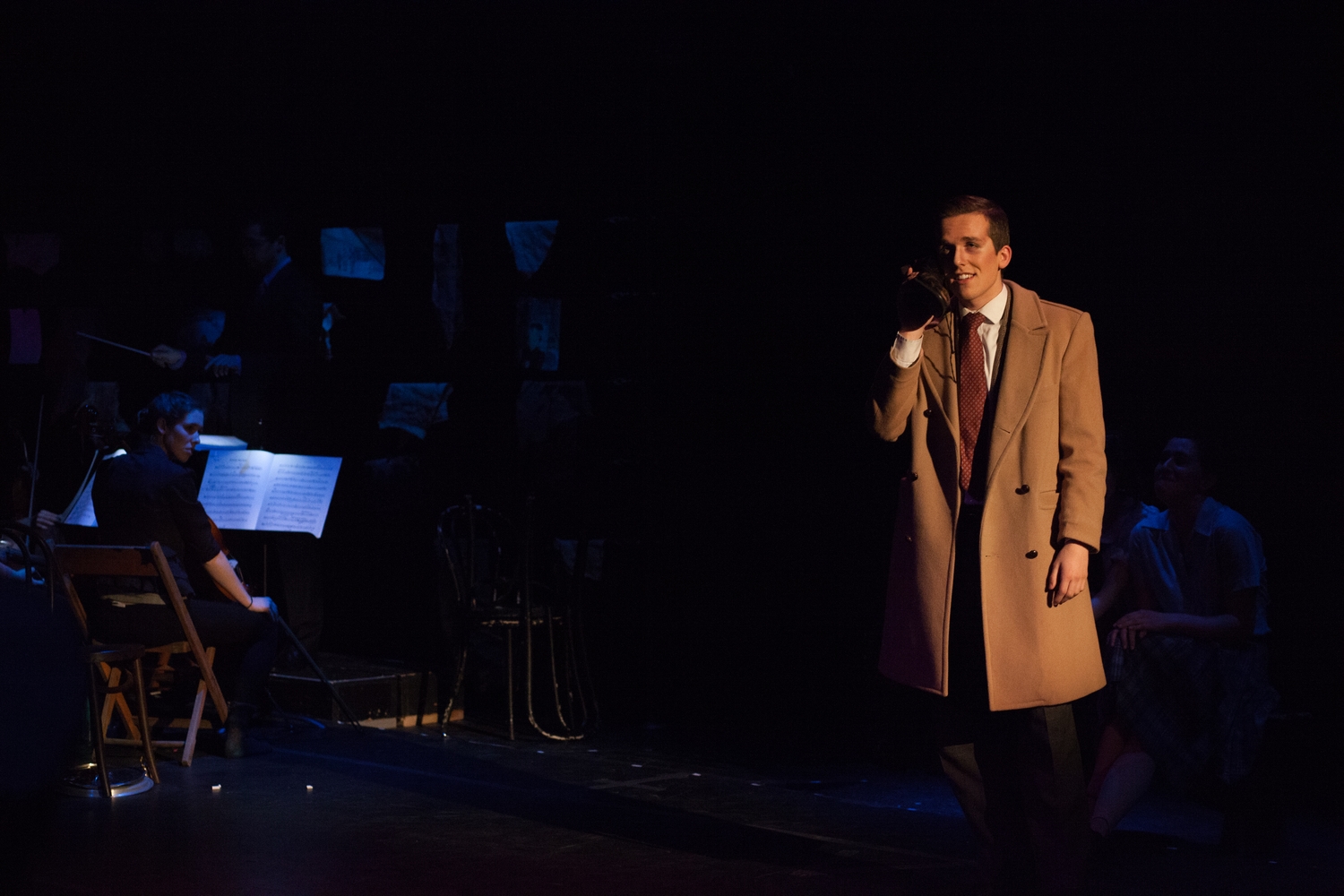
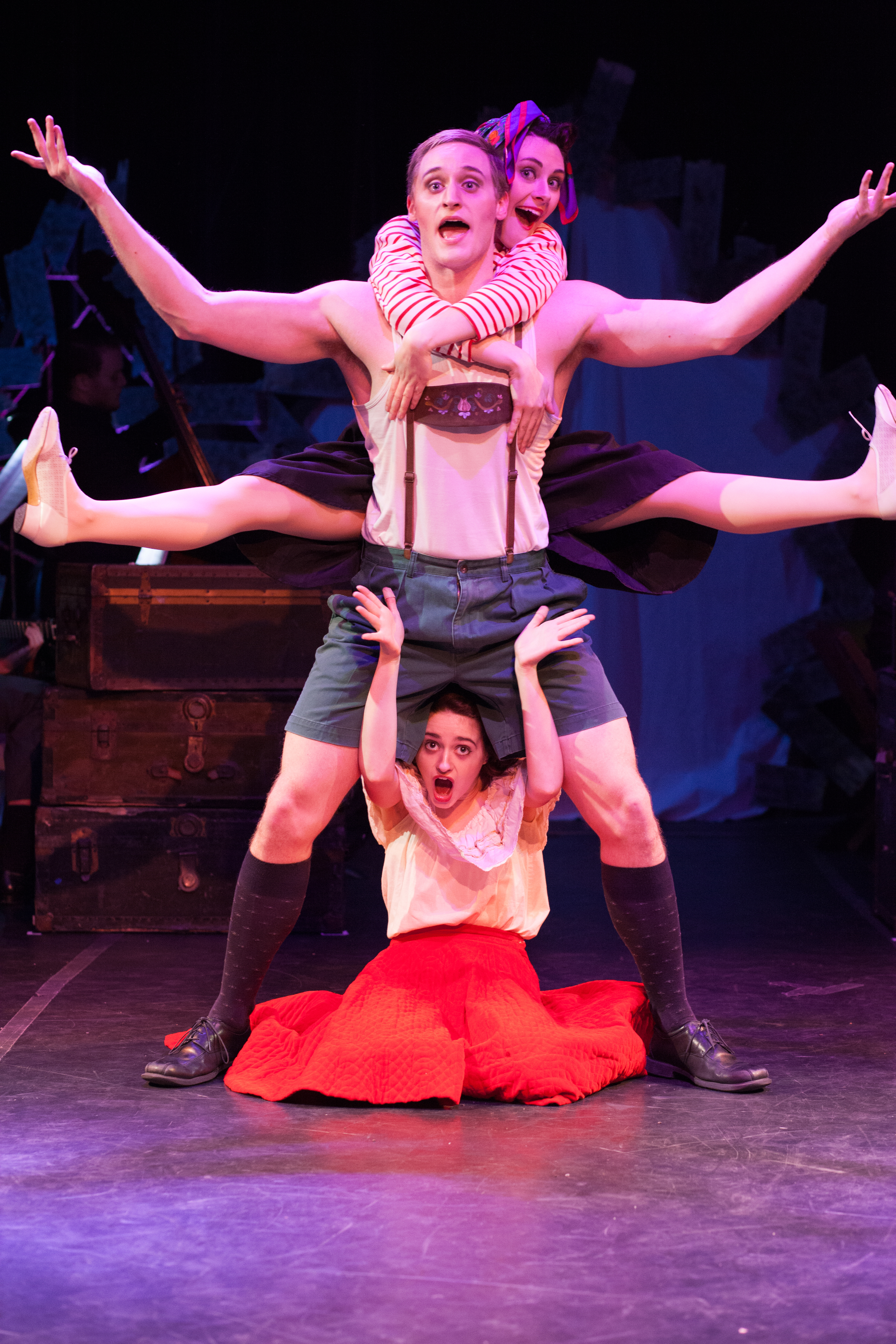
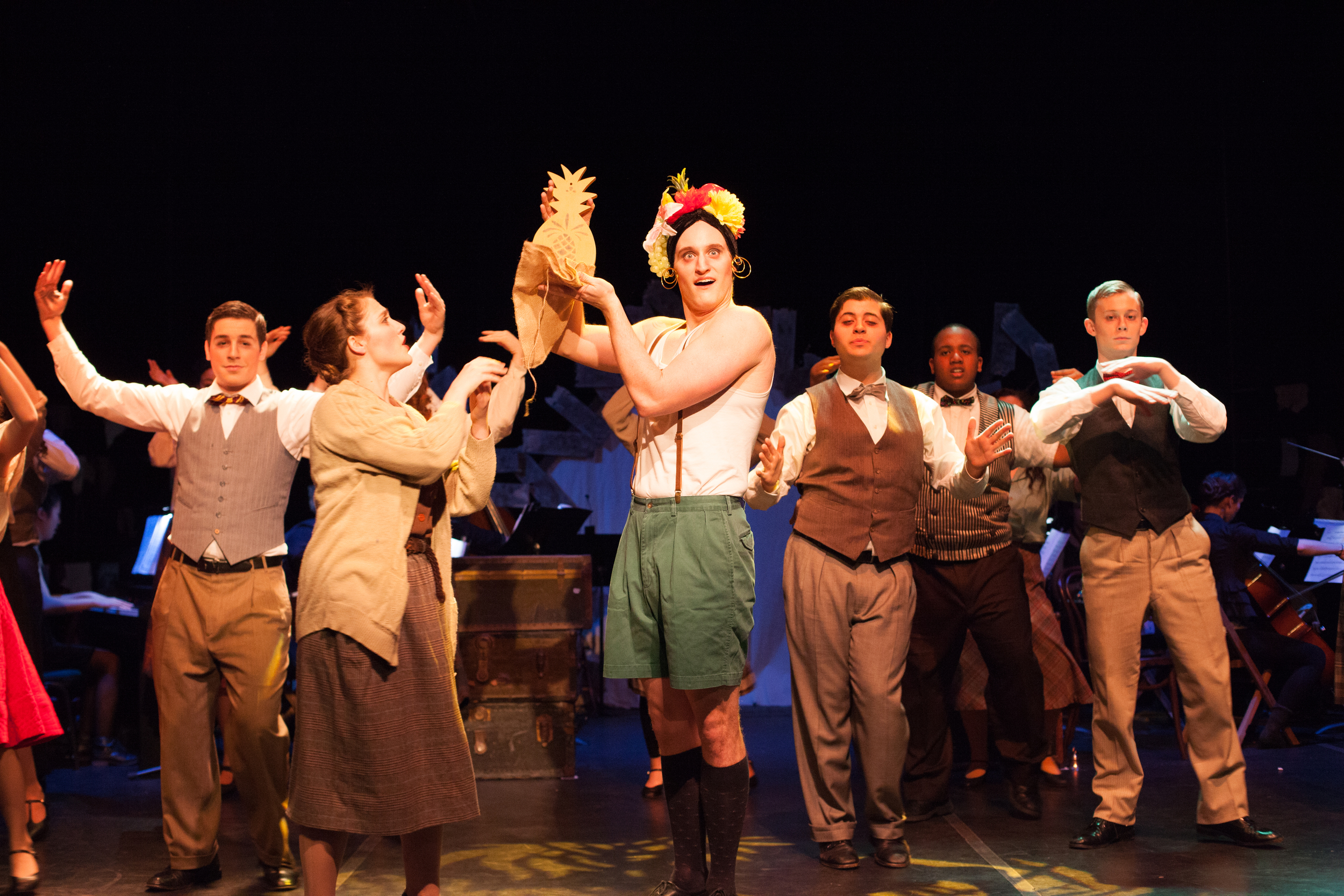
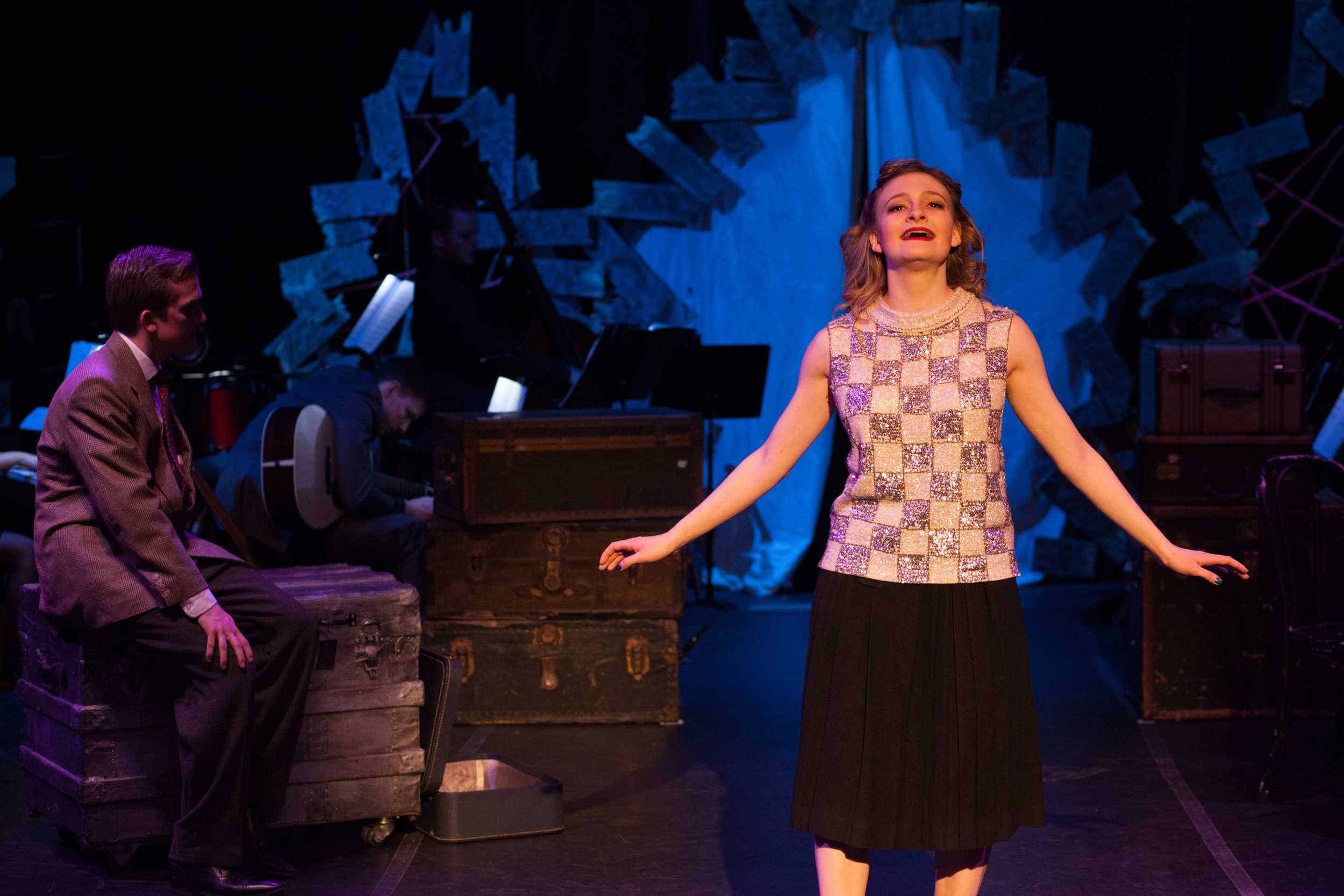
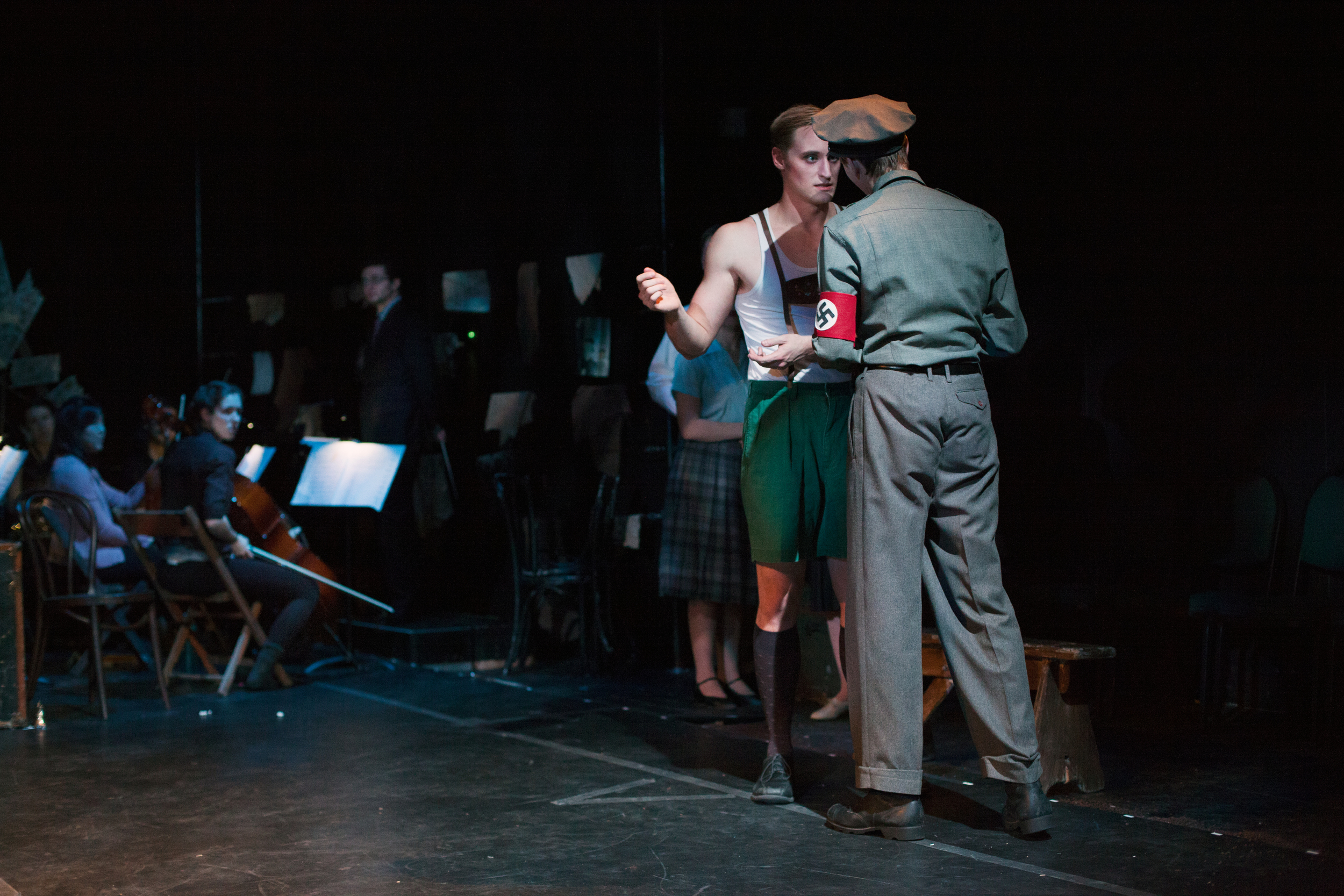
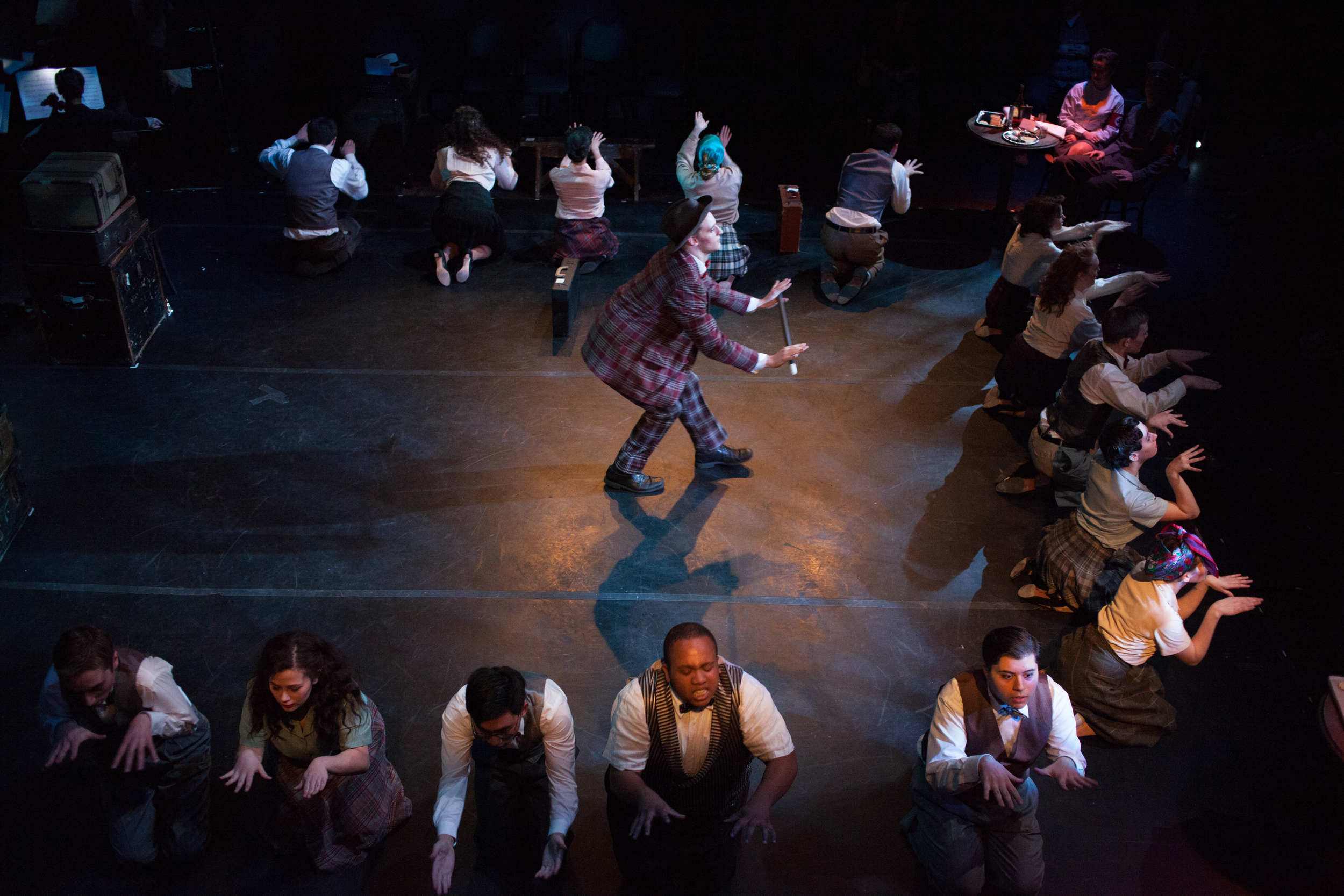
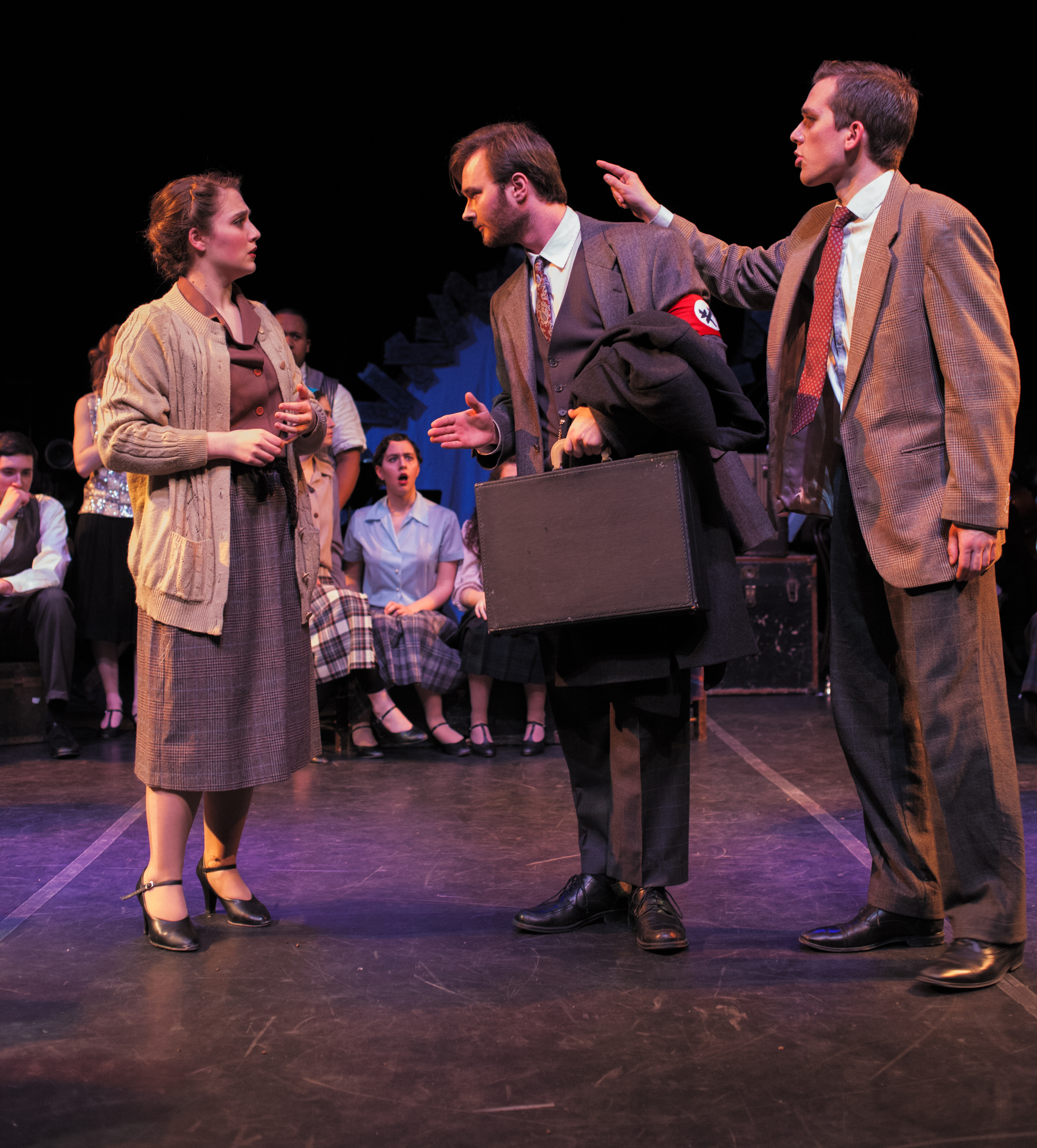
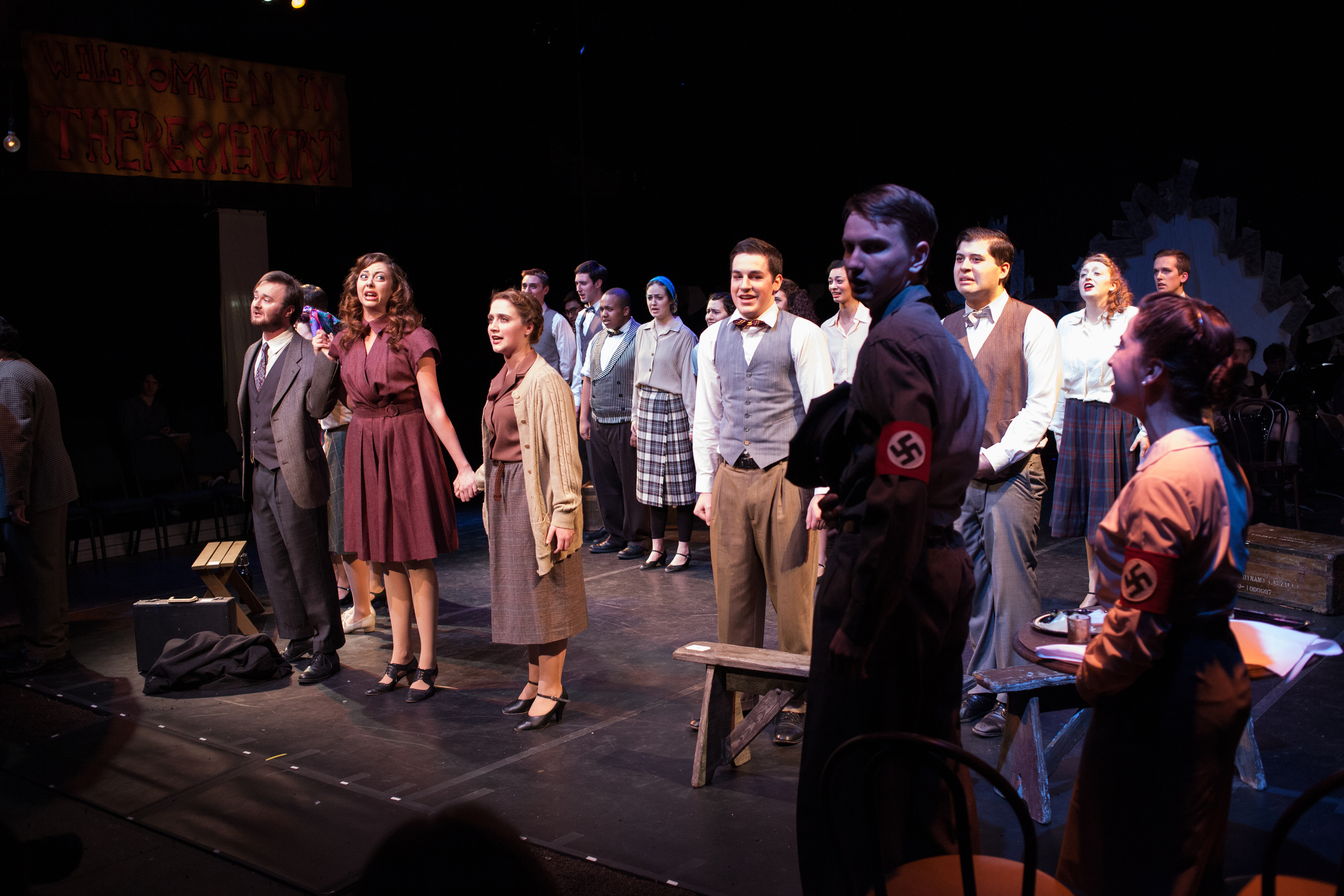
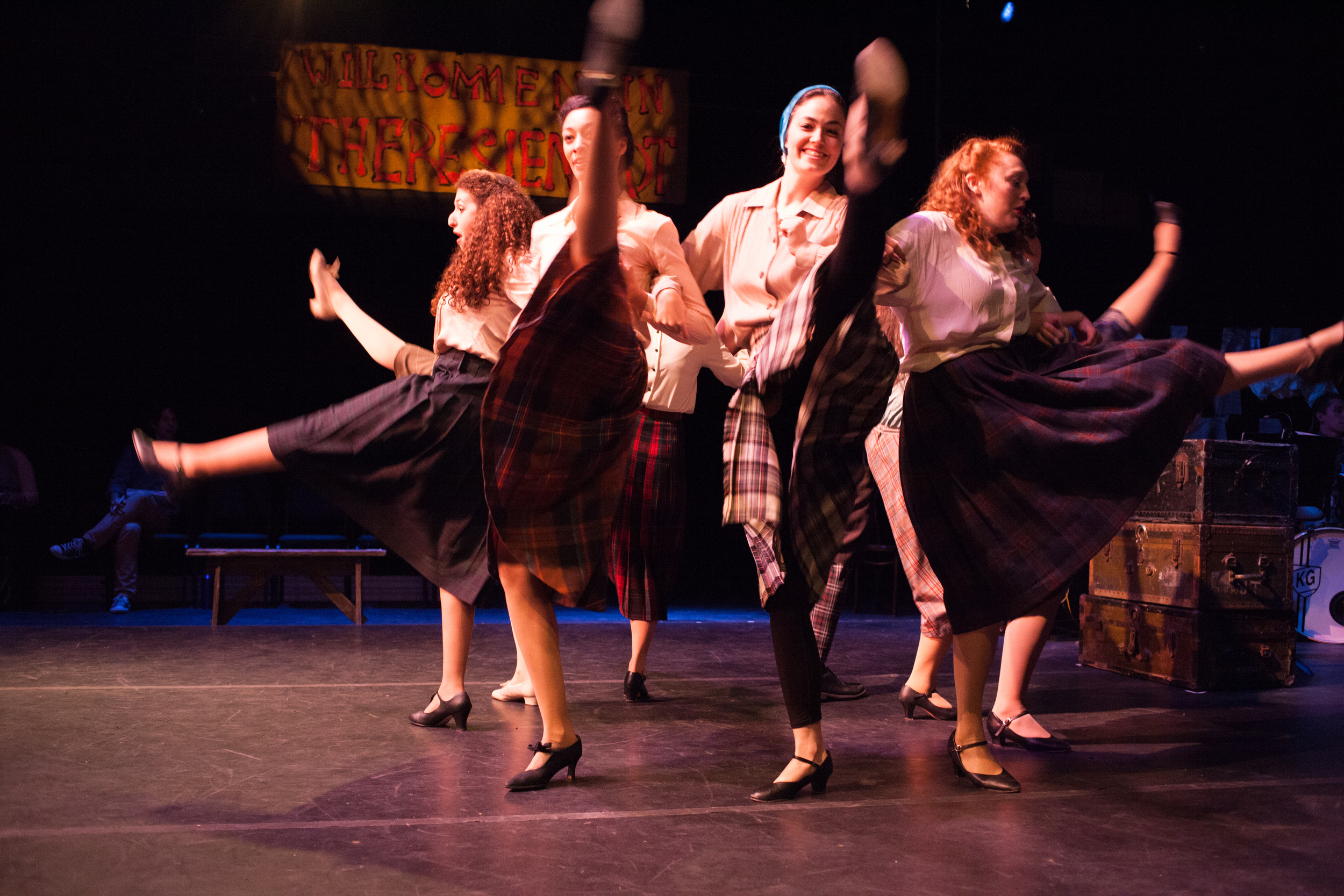
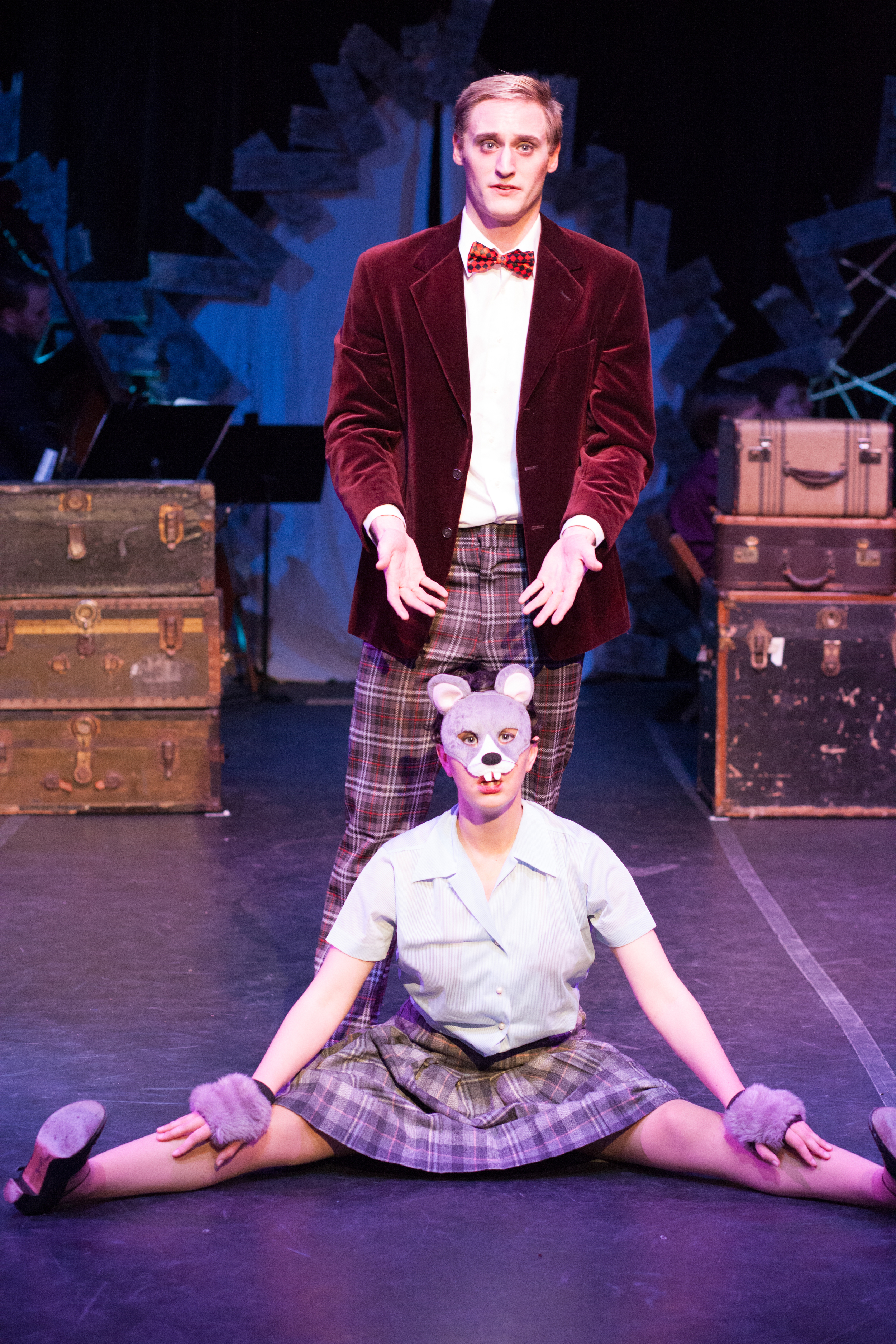
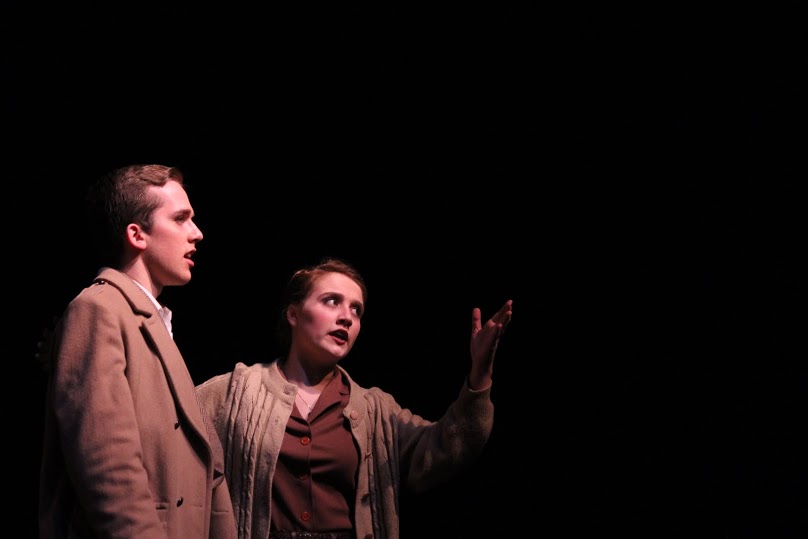
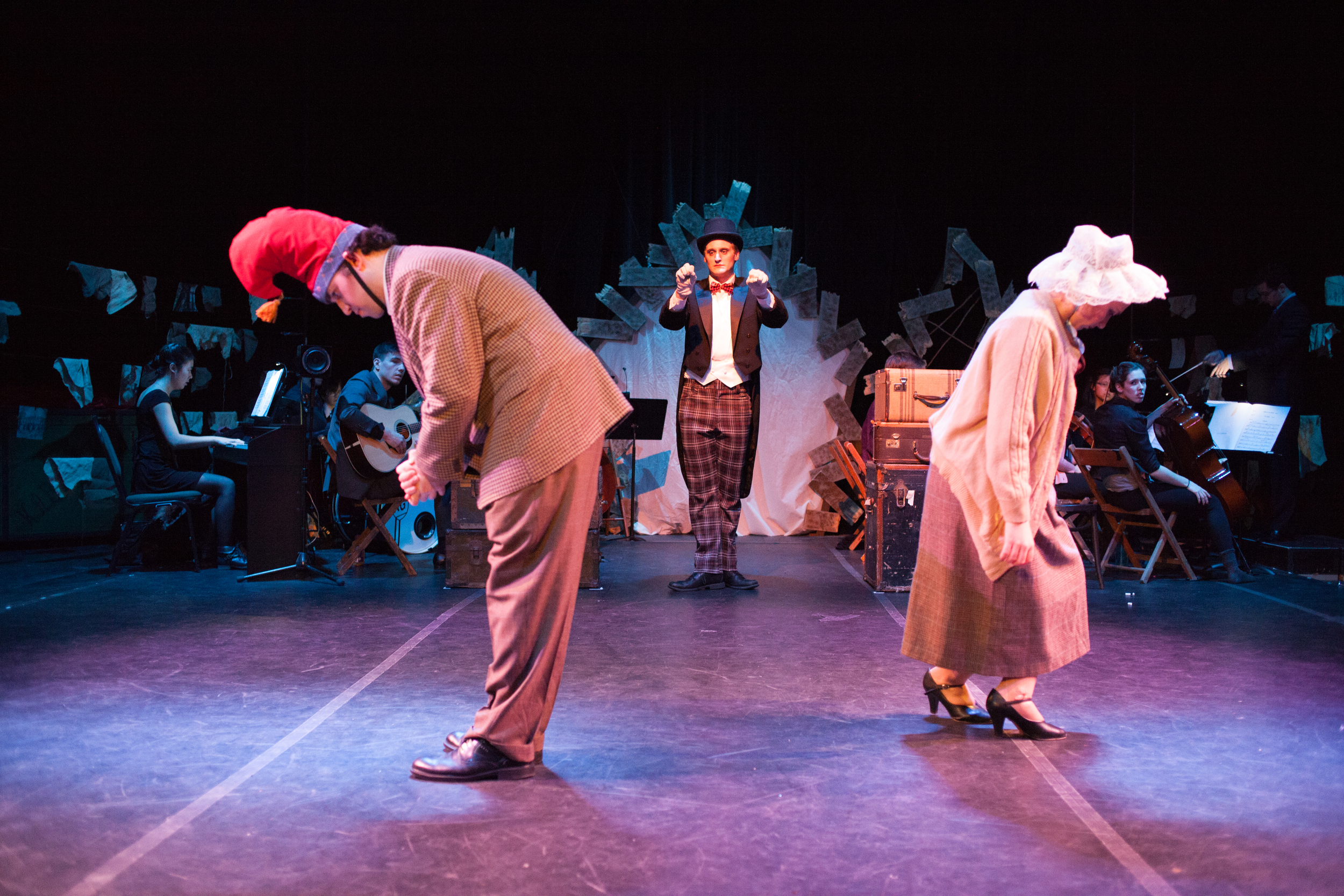
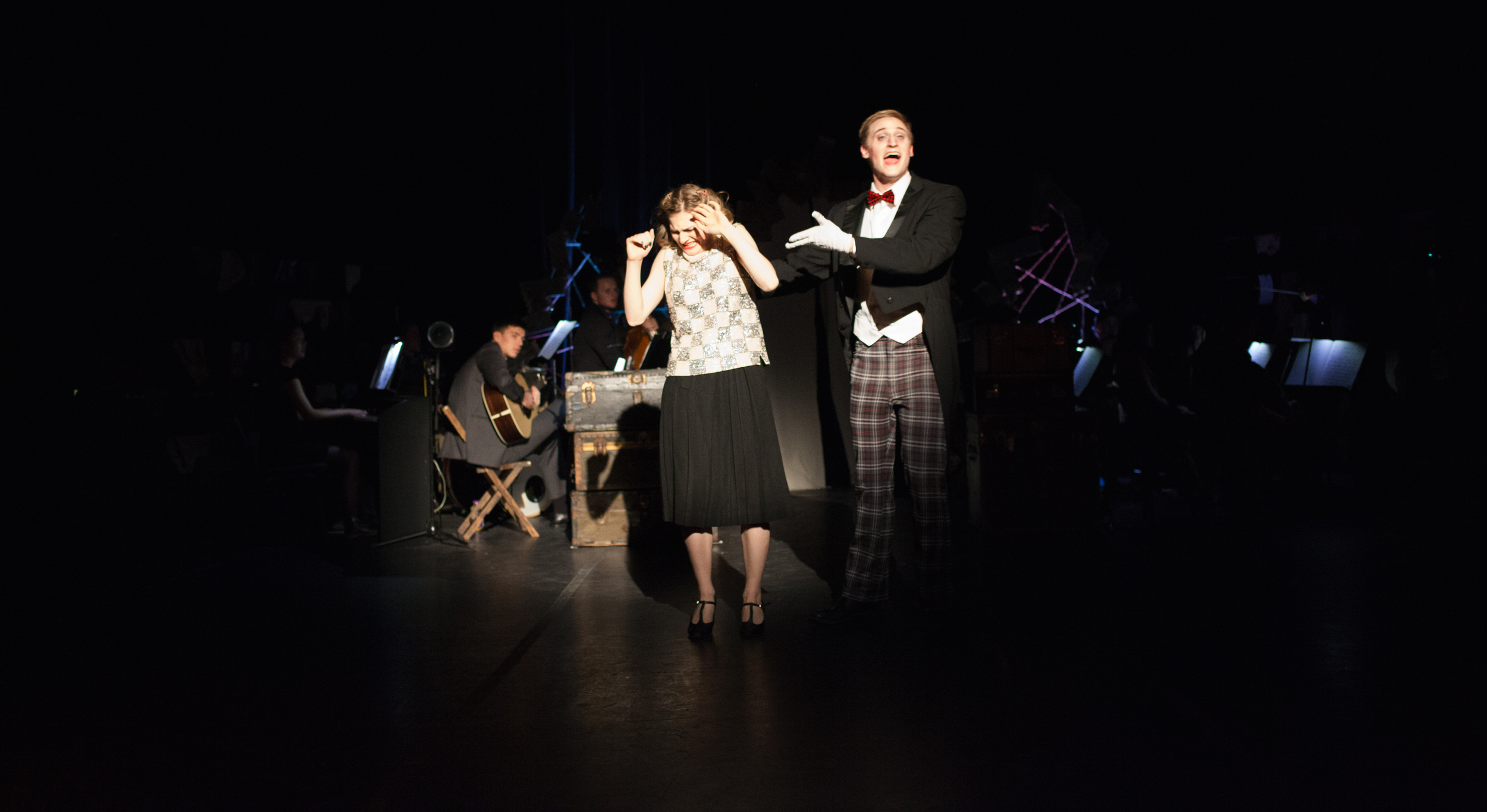
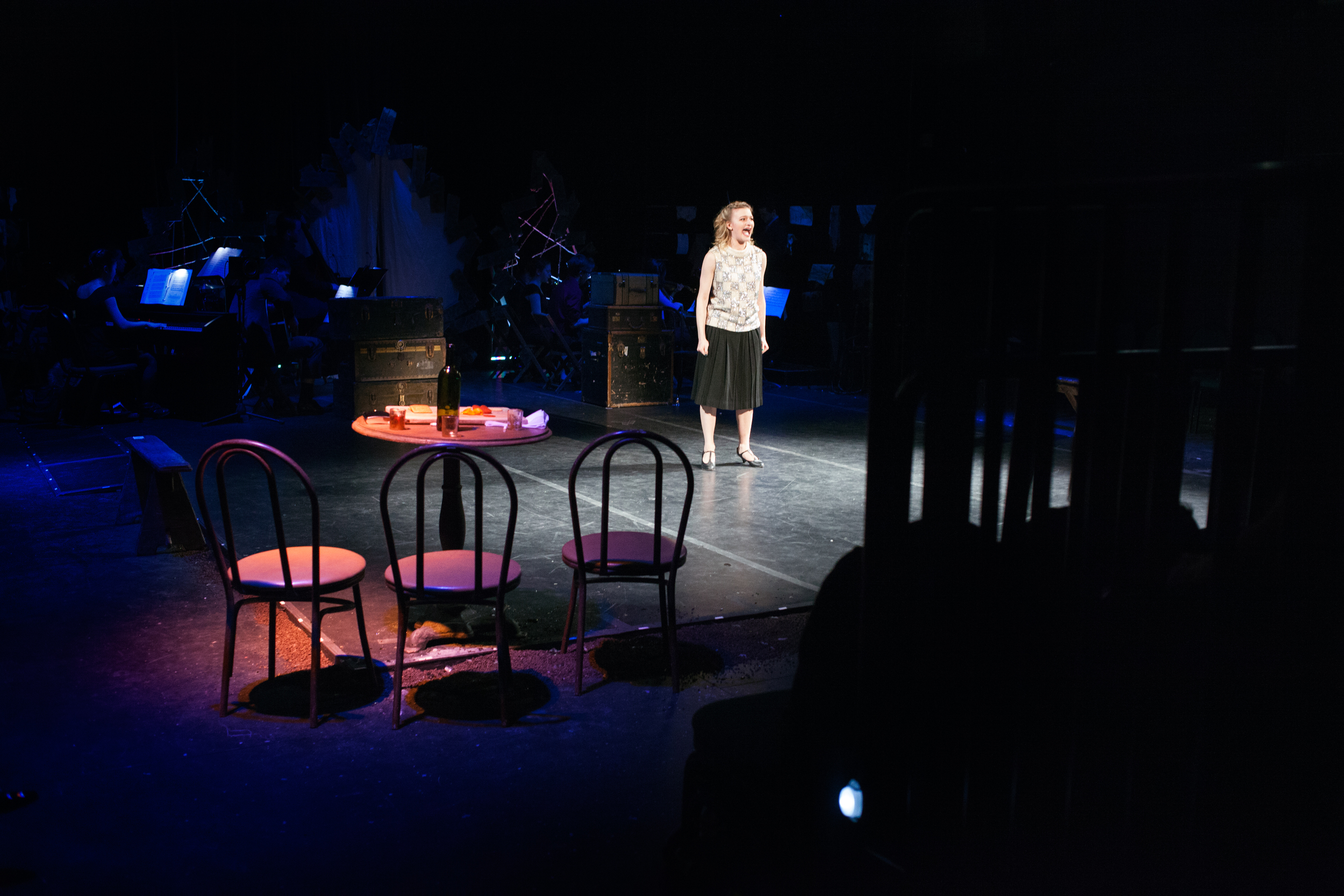
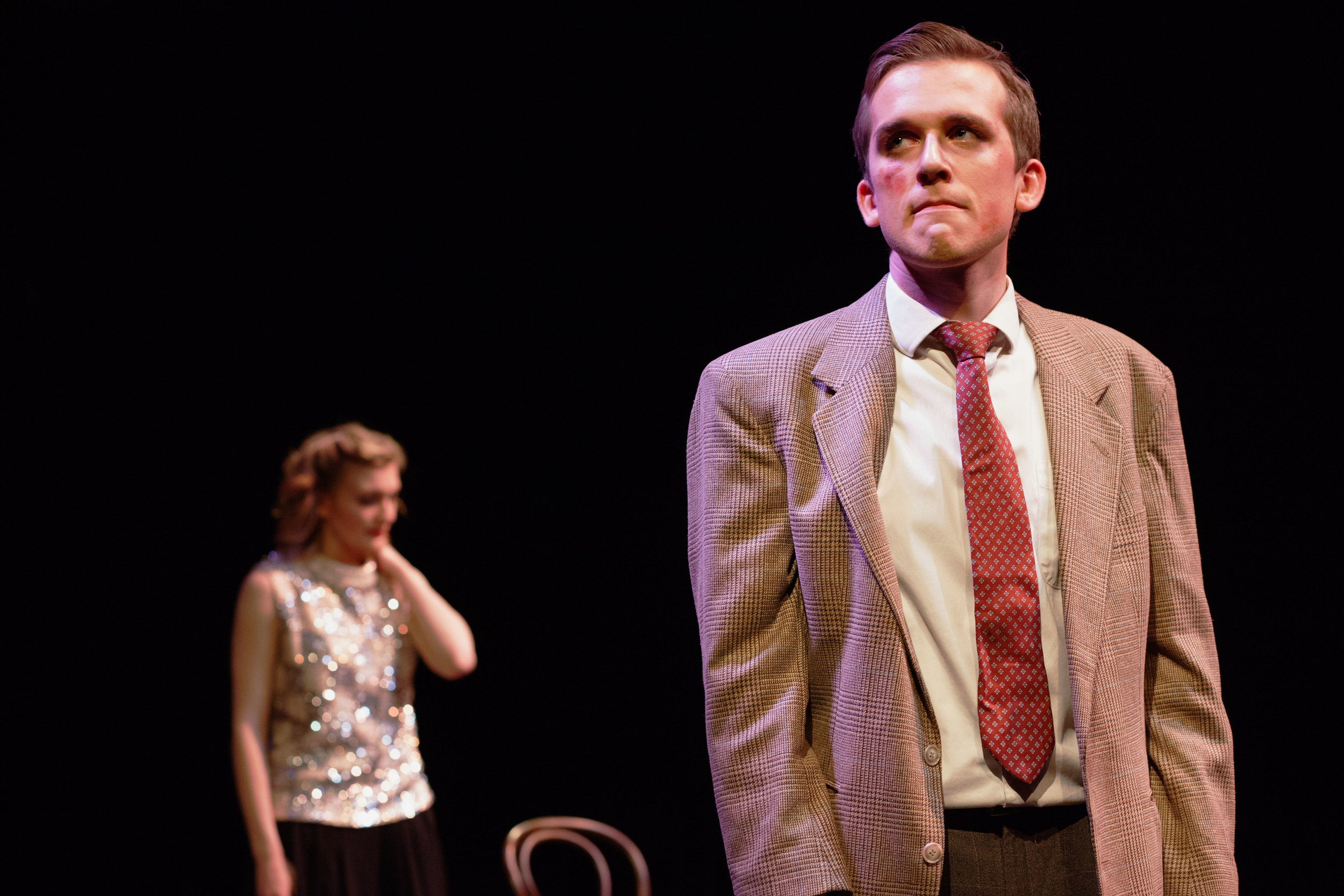
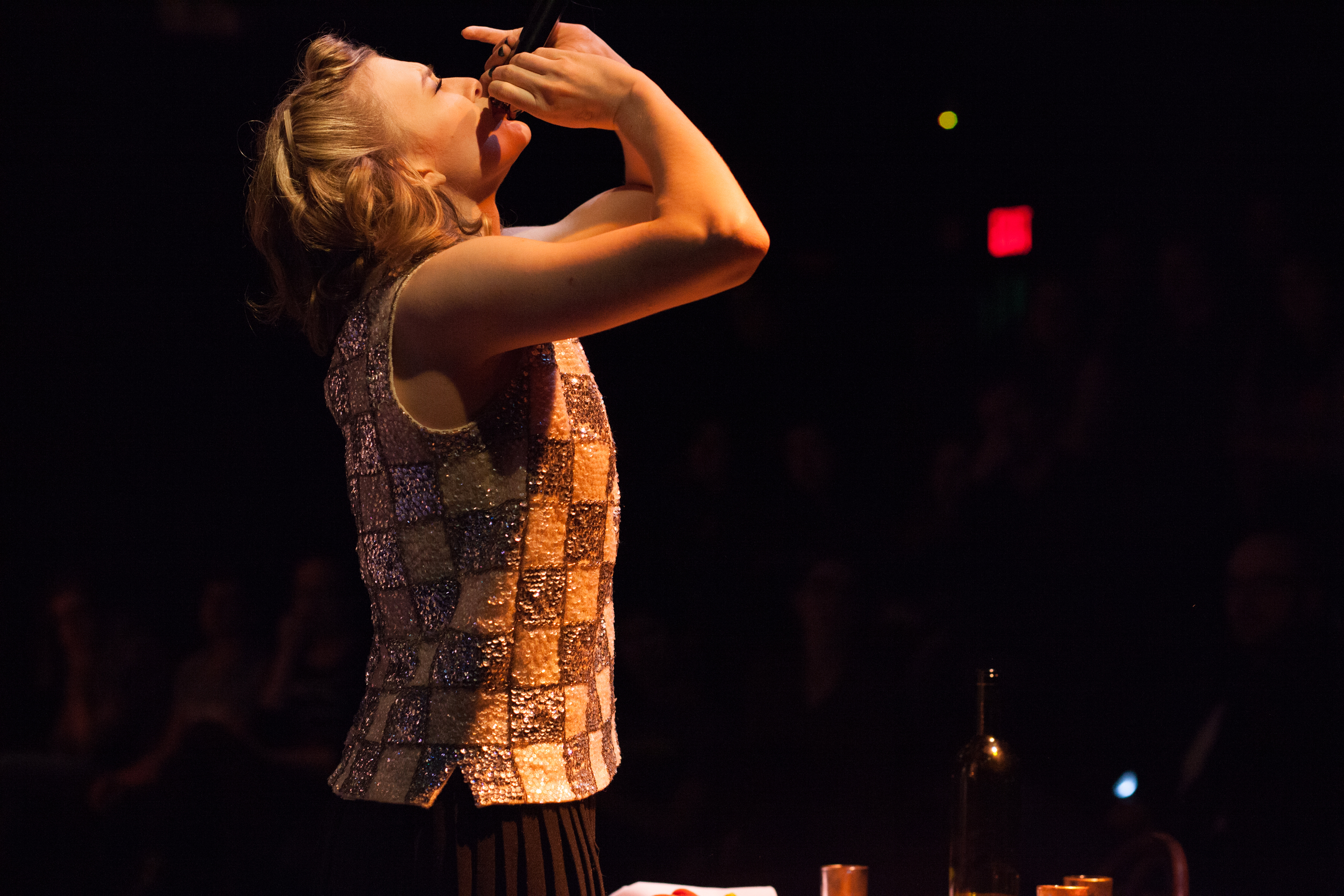
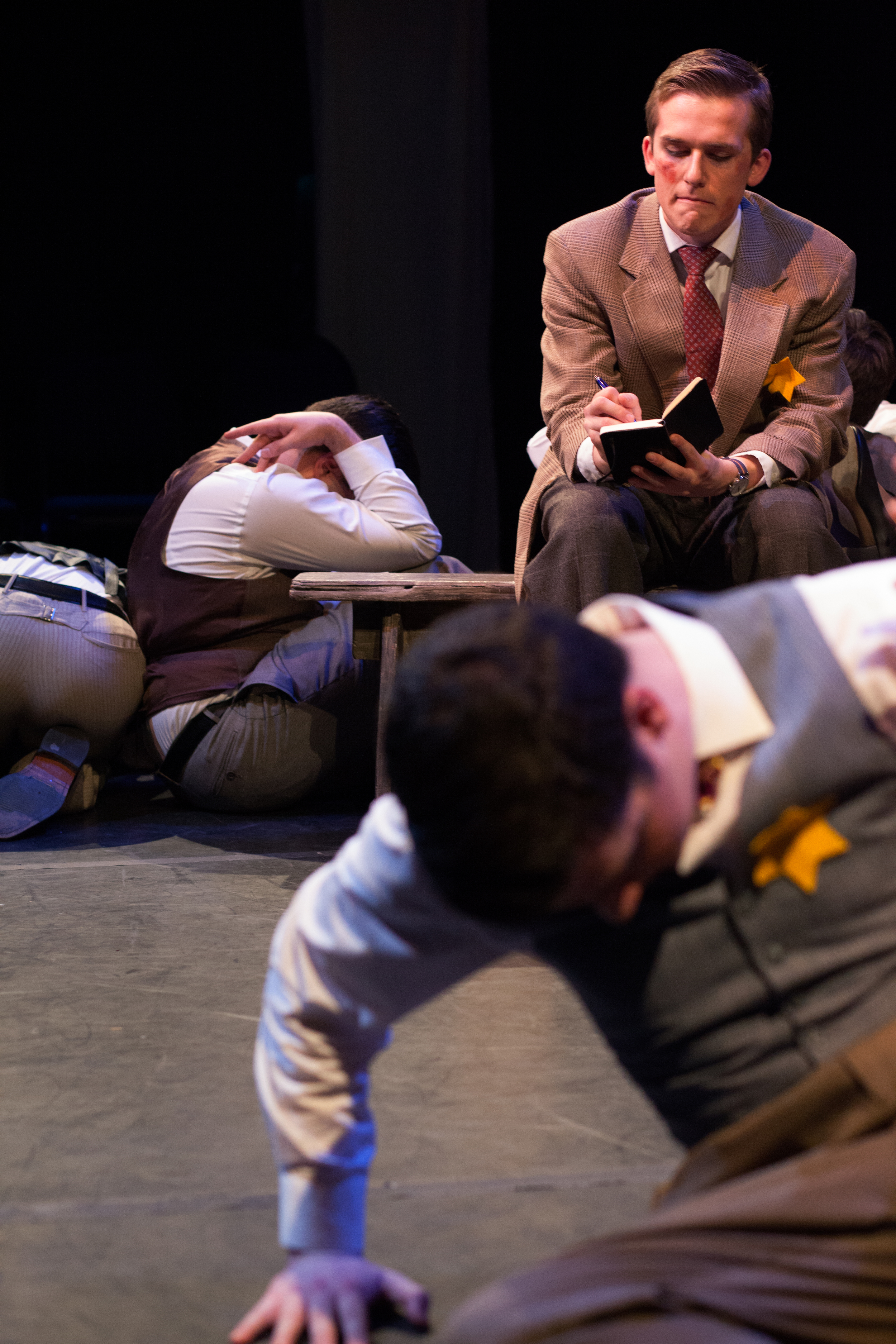
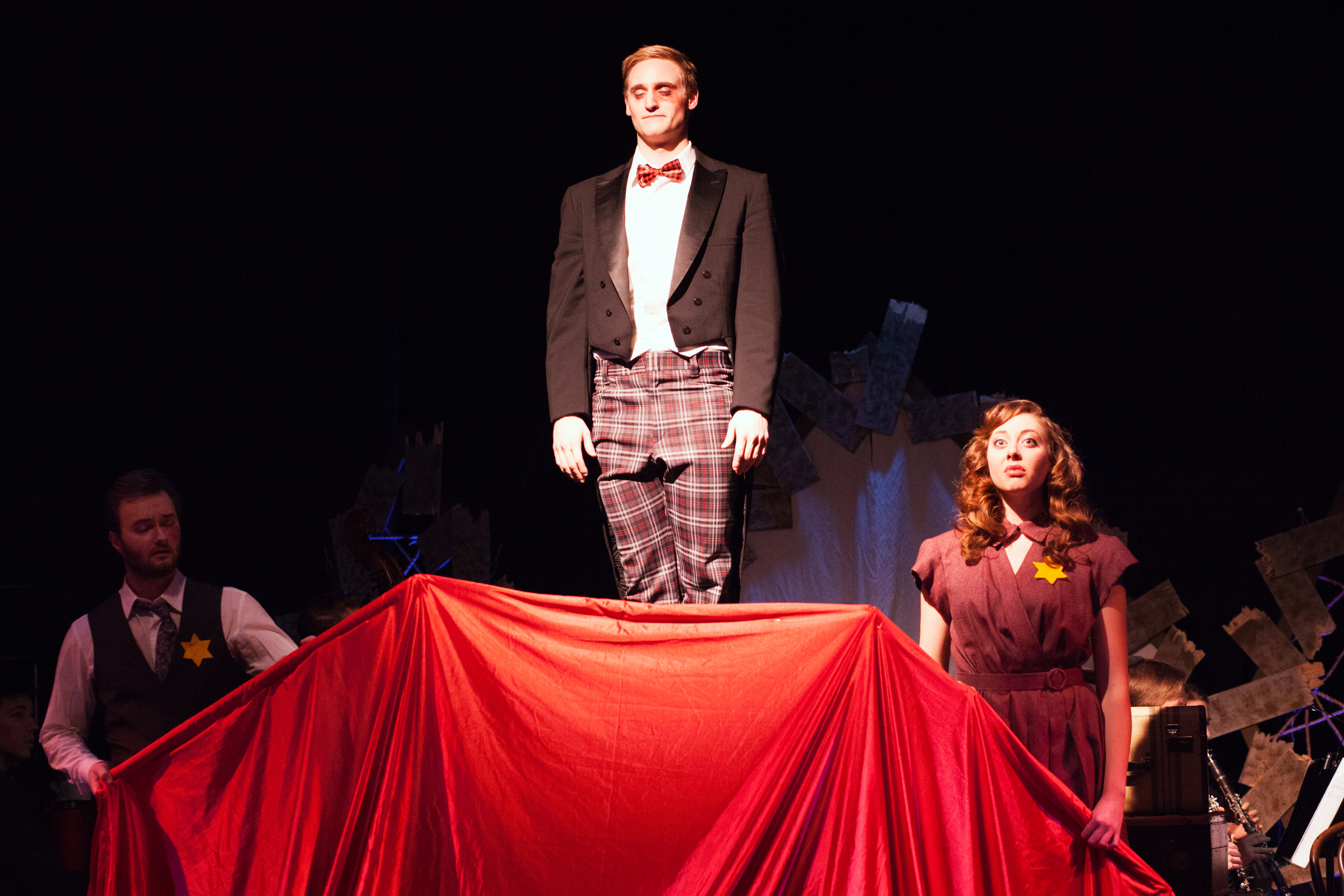
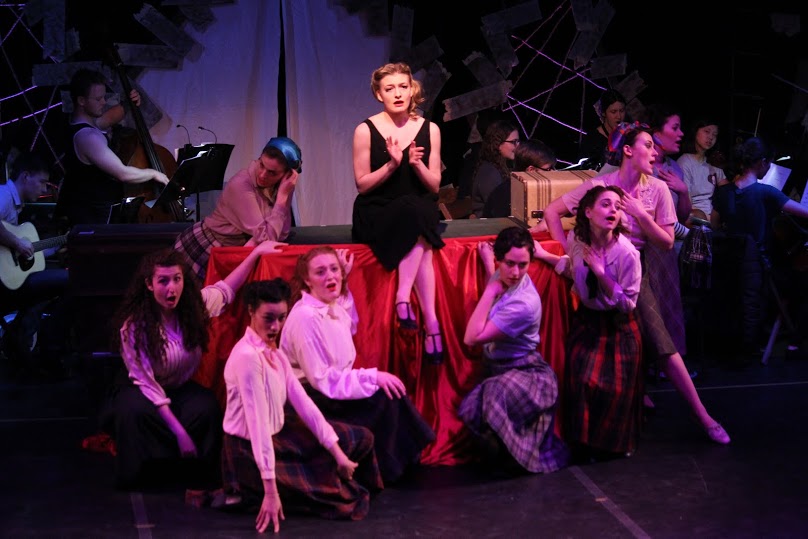
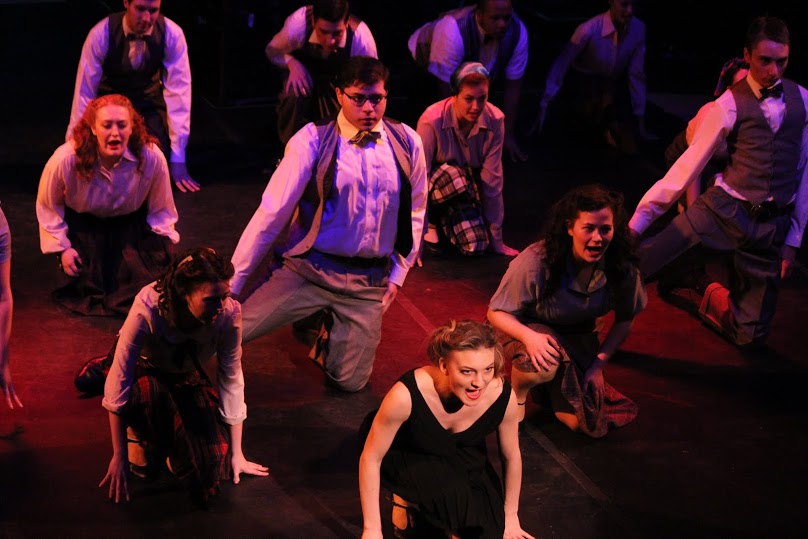
CREATIVE TEAM
directed by Noam Shapiro
produced by Irina Gavrilova & Crystal Liu
stage managed by Danielle Derlein
music directed by Julian Hornik
choreographed by Eliza Dach
orchestra conducted by Derek Braverman
dramaturgy by Anya Markowitz
production manager: Nathan Roberts
set designed by Hannah Friedman
lighting designed by Gabrielle Roberts
sound designed by Janine Chow
technical direction by Lee O'Reilly, Lidiya Kukova & Tom Delgado
master electrician: Varun Sah
costumes designed by Yanglin Cai
makeup designed by Alexa Derman
hair designed by Charlotte Juergens
props designed by Bianka Ukleja
assistant stage managed by Yuni Chang, Camille Chiquet, Isabel Mendia, Anna Piwowar, and Andrew Schmidt
assistant costume designed by Cara Washington
photography by Andrew Schmidt
ENSEMBLE
Nathaniel Dolquist (The Emcee)
Rebecca Brudner (Sally Bowles)
Sarah Chapin (Fräulein Schneider)
Michael Tappel (Clifford Bradshaw)
Dan Rubins (Herr Schultz)
Charlotte Juergens (Fräulein Kost)
Reed Morgan (Ernst Ludwig)
Jae Shin (Max)
Michaela Murphy (Rosie)
Eleanor Slota (Lulu)
Erin Krebs (Texas)
Anya Markowitz (Frenchie)
Lilla Brody (Gretl)
Ellie Boswell (Bertha)
Danielle Lotridge (Fritzie)
Natalie Rose Schwartz (Helga)
Aaron McAleavey (Bobby)
Hershel Louis Holiday, Jr. (Victor)
Dillon Miller (Herman)
Greg Suralik (Rudy)
Miles Walter (Wilhelm)
Tom Cusano (Schnitzel)
Noah Konkus (SS-Obergruppenführer Amon)
Nolan Phillips (SS- Gruppenführer Christof)
Levi Gray (SS-Helferin Ilsa)
Erin Hebert (SS-Helferin Maria)
Stefanie Fernandez ((SS-Helferin Marta)
CABARET
My senior thesis in directing at Yale College reimagined John Kander, Fred Ebb and Joe Masteroff’s Cabaret as a performance by the inmates of the Theresienstadt Concentration Camp before an audience of international visitors from the Red Cross. Whereas most productions of Cabaret are set within a seedy nightclub, my interpretation of Cabaret was based on cabaret performances that occurred in WWII's concentration camps and an actual visit by the International Red Cross to the Theresienstadt Camp in 1944. By staging Cabaret as a performance within Theresienstadt, my production aimed to share the relatively untold story of coerced and subversive theatrical performances that emerged from the Shoah, or Holocaust, as a strategy for survival, rebellion, and the retention of humanity.
Located in Czechoslovakia, Theresienstadt was the Nazi’s “Model Ghetto,” advertised to the world as “Hitler’s City for the Jews.” In 1944, rumors of Nazi atrocities began to circulate throughout Europe. In response to these rumors, the International Red Cross requested a visit to the Nazis’ camps. To prepare for the Red Cross’s arrival, the Nazis transformed Theresienstadt into an ideal “Potemkin village” to showcase to the world. The ghetto was “beautified,” with the creation of sports fields, coffee houses, spas, and “children’s homes,” all of which were constructed to obscure the camp’s stench, overcrowding and disease.
Beyond its status as the Nazis' model camp, Theresienstadt was also the temporary destination for many of Western Europe’s celebrated Jewish artists and intellectuals. Between 1941 and 1945 the Nazis condoned, and in some cases commanded, performances by the inmates. On average, there were fifteen different performances a day, with tickets often sold to the general public. It was only during these cultural events that the prisoners were allowed to remove their yellow stars or identity badges. Between 1941 and 1944, the camp’s prisoners organized thousands of performances, concerts and lectures in their struggle to hold onto their individual identities in the face of degradation and the constant threat of deportation to the 'East'.
My production was inspired by a groundbreaking article published by Holocaust survivor Curt Daniel in November 1941 entitled, “The Freest Theatre in the Reich: In the German Concentration Camps,” which detailed the culture of coerced and subversive cabaret performance within many of the Nazi concentration camps. Although it is unclear if Kander, Ebb, or Masteroff read “The Freest Theatre in the Reich," there are resonances between theatrical performances during the Holocaust and elements of the book, music, and lyrics of Cabaret.
"Leave your troubles outside! So--Life is disappointing? In here Life is Beautiful. The girls are beautiful. Even the orchestra is beautiful... Outside it is winter but here it is so hot--every night we have to battle the girls from taking off all their clothing. So don't go away. Who knows? Tonight we may lose the battle!"
CABARET, 1966, Book by Joe Masteroff, Music by John Kander, Lyrics by Fred Ebb
“My friends, you are lucky to be here this afternoon. Here, in Buchenwald, we have the best art and the best artists in the whole of Germany. Here you can actually laugh out loud at our jokes. Here is the freest theatre in the Reich. In the theatres outside, the actors and the audience are frightened because they fear that they may end up in a Concentration Camp. That's something we don't have to worry about.”
Originally published in Theatre Arts. “The Freest Theatre in the Reich”: THEATRE IN THE GERMAN CONCENTRATION CAMPS . Curt Daniel. New York: Theatre Arts, Inc., November 1941. pp. 801-807
In addition to interpreting Cabaret through a new lens, my production drew from Peter Brook’s 1967 staging of Peter Weiss’ 'The Persecution and Assassination of Jean-Paul Marat as Performed by the Inmates of the Asylum of Charenton Under the Direction of the Marquis de Sade.' Like Marat/Sade, my Cabaret explored the relationship between the spectator and performer, as well as the nature of creative rebellion and political theatre in a state of oppression and captivity. My dramaturgical research for this production focused on theater as a strategy of survival and theater as a transformative, transcendent and therapeutic experience. Throughout the production process, my entire creative team grappled with how to represent the irrepresentable and to how to theatricalize traumatic experiences. In doing so, my production aimed to bear witness to the emptiness and silences left by those who perished in the Shoah.
At the same time, my cast and production staff examined what psychiatrist and a Holocaust survivor Viktor Frankl termed “man’s search for meaning” in relation to theatrical performances during the Shoah. In observing the life, beauty, and humanity that existed in the midst of violence, death, and trauma, my production of Cabaret sought to preserve the memory of the artists who created what Holocaust survivor Curt Daniel described as “one of man’s greatest achievements in adversity.”
Cabaret received widespread support across Yale University and was co-produced by the Theater Studies Program at Yale University and a Berkeley College Creative and Performing Arts Award, with financial support from the Calhoun College Mellon Forum Fund, Calhoun College Class of 1959 Fund, The Department of Slavic Languages and Literatures at Yale University, The Yale Program for the Study of Antisemitism, The Joseph Slifka Center for Jewish Life at Yale, a discretionary arts award from Ezra Stiles College, The Hebrew Program at Yale University, The Judaic Studies Program at Yale University, and additional support from David & Charlotte Koskoff. With a budget of approximately $5,000, a cast of 27, an orchestra of 16 musicians, and a production staff of nearly 25 collaborators, Cabaret featured the largest undergraduate ensemble and company of the 2014-2015 academic year at Yale University.
Synopsis:
As the Nazis begin their ascent to power in the early 1930s, American writer Cliff Bradshaw visits Germany to begin his next book. Searching for inspiration in Berlin, he meets Sally Bowles at a cabaret called the Kit Kat Klub. Soon, Sally and Cliff move into a boarding house run by Fräulein Schneider and her suitor, Herr Schultz, a Jewish grocer. As Germany transforms at the hands of the Nazis, however, Cliff, Sally, Schneider and Schultz's world and beliefs are disrupted forever.
PRESS
“From re-imagined productions to immersive operas, college musical theatre programs are bursting with students who aren’t afraid to push boundaries and think outside the box... with well deserved payoff. Here are a few inspired college productions that have caught the attention of our staff.”
"Innovative College Productions That Thought Outside the Theatrical Box," by Olivia Clement for Playbill.com, August 24, 2015
“Shapiro’s version recaptures the solace and pain that has often been lost in other stagings of the musical... Shapiro will not let us rest easy thinking we can forget and allow the Holocaust to be obscured by the glitz and glamour of Broadway. Part of me is scared no future “Cabaret” performance will live up to the ecstasy and the pain of this revelatory production.”
"Coming to Cabaret for the First Time," by Stephanie Rogers for the Yale Daily News, February 6, 2015
“Noam Shapiro’s Cabaret is, on every level, a stunning ode to the power of performance in the face of the unthinkable. It maintains that theater – even in the most coercive, restrictive circumstances – is a means for the oppressed to exert power on their oppressors, to defy and resist restrictions on their expression, and to claim for themselves hope, humanity, and dignity.”
"Performance, Power, and Survival in Cabaret" by Layla-Treuhaft Ali for Broad Recognition, February 17, 2015
“It’s a very different “Cabaret”... Noam is famous for his twists and for doing familiar works in a very different way... With 27 cast members and a band of 16 musicians, the show features the largest undergraduate ensemble of the academic year... The production has drawn widespread support from a range of organizations and sources affiliated with Yale... more than seven of Yale’s institutions... made large donations towards the production. ”
"Musical sets Broadway classic in Nazi Concentration Camp," by Joey Ye for the Yale Daily News, February 4, 2015
"Cabaret Show Brings History to Life" - Yale Daily News reporter Annaelise Morello reports on one of Yale's student productions: Cabaret, directed by Noam Shapiro. Featured on the official YouTube channel of the Yale Daily News: America's Oldest College Daily newspaper. YTV Editors, Isabel McCullough, Steffina Yuli and Michael Leopold
